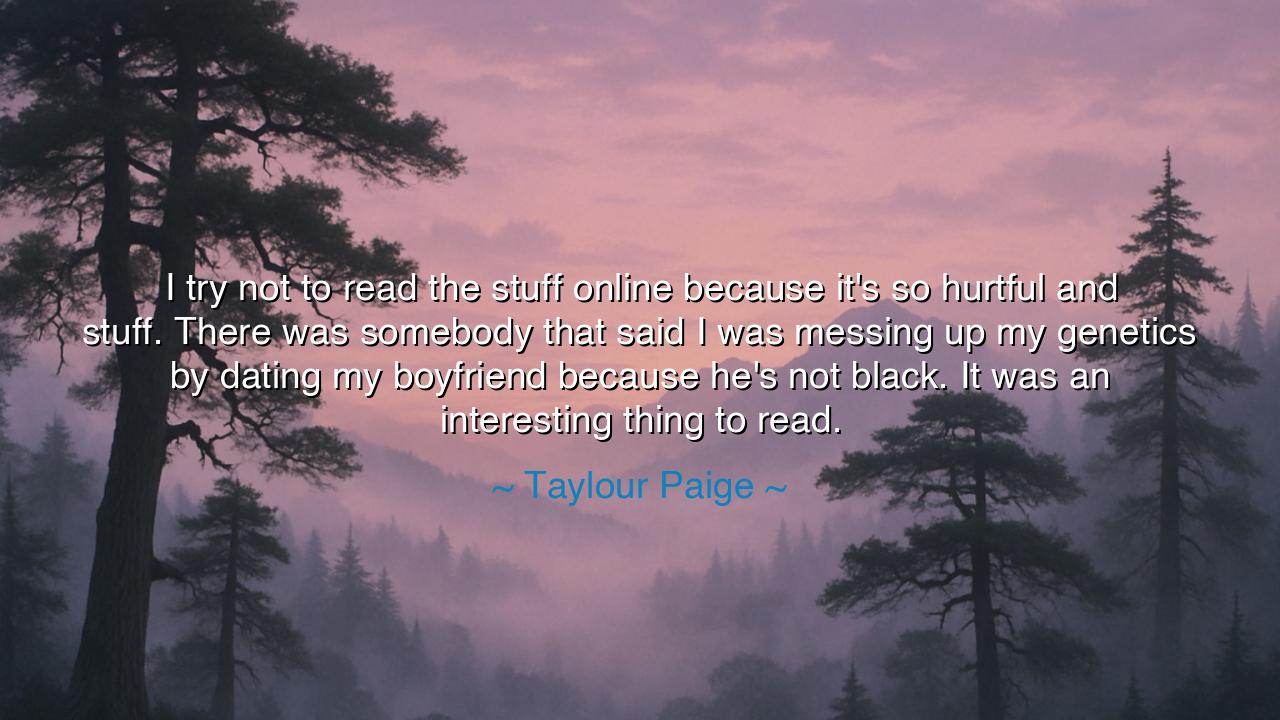
I try not to read the stuff online because it's so hurtful and
I try not to read the stuff online because it's so hurtful and stuff. There was somebody that said I was messing up my genetics by dating my boyfriend because he's not black. It was an interesting thing to read.






In the brave and vulnerable words of Taylour Paige, we hear the cry of a soul wounded by the world’s misunderstanding: “I try not to read the stuff online because it's so hurtful and stuff. There was somebody that said I was messing up my genetics by dating my boyfriend because he's not black. It was an interesting thing to read.” What she reveals here is more than a personal grievance — it is a glimpse into the ancient battle between love and prejudice, between the yearning of the heart and the shackles of human judgment. Her tone is gentle, even restrained, yet the pain beneath it is deep — the pain of being told that love, the purest act of connection, can somehow be wrong when measured by the color of one’s skin.
Taylour Paige, an actress and dancer known for her authenticity and strength, speaks from the heart of modern humanity — a world where technology amplifies both truth and cruelty. When she says she tries not to read “the stuff online,” she echoes a universal struggle: the fight to preserve one’s spirit amid a chorus of voices eager to tear it down. The hurtful words she encountered were not just insults; they were echoes of history, of ancient divisions that still haunt the human soul. Her experience is the modern form of an old trial — for throughout the ages, those who dared to love freely have often been condemned by those bound by fear and ignorance.
The origin of her quote lies not only in her personal encounter with racism, but in a society still learning what it means to honor humanity over heritage. In every age, love has been tested by the boundaries that men impose. In ancient Rome, marriages between classes were forbidden. In medieval times, faith divided lovers who would otherwise have been joined. And in more recent centuries, laws against interracial marriage declared that affection itself was a crime against nature. When Taylour speaks of being told she was “messing up [her] genetics,” she gives voice to the same ancient lie — that love must serve division, that purity of blood matters more than purity of heart. It is a lie that has destroyed families, silenced hearts, and waged wars upon the innocent.
Yet, through her composure, there is also strength. Her phrase, “It was an interesting thing to read,” carries the weight of grace — a quiet defiance that chooses reflection over rage. It is the wisdom of one who refuses to let hatred shape her identity. For the wise know that ignorance does not define truth, and that the measure of love lies not in approval, but in courage. In this way, Taylour stands among the great souls of history who have faced judgment with dignity — those like Mildred and Richard Loving, whose marriage across racial lines led to the Supreme Court case that struck down laws banning interracial unions in America. The Lovings’ name itself became prophetic, for it was through their love that a nation was forced to confront its fear.
Her story, and theirs, remind us that love is the most revolutionary act of all. The world often worships progress in science, politics, and art, but true progress begins in the heart — when one human being dares to love another despite the boundaries others would erect. Those who judge by appearance are like those who stare at the ocean and see only the waves, not the depths beneath. But those who love beyond race, class, or creed touch something eternal — they glimpse the divine unity that underlies all life. As the philosopher Marcus Aurelius once said, “We are made for cooperation, like feet, like hands, like eyelids.” Love is that cooperation of souls, that harmony that reveals we are not strangers, but kin.
There is also in her words a lesson about the poison of comparison and judgment in the digital age. The internet, once meant to connect humanity, too often becomes a tool for division — a mirror that reflects not our wisdom, but our wounds. Taylour’s choice “not to read the stuff online” is not avoidance, but self-preservation. The ancients would have called it guarding the soul, for to allow every voice of the world to enter one’s spirit is to invite chaos into the temple of the heart. We, too, must learn this discipline — to turn our eyes from the noise of hate and listen instead to the still voice of truth within us.
Thus, her words become not a lament, but a teaching: love bravely, live truthfully, and guard your peace. When the world scorns your heart, remember that it fears what it cannot understand. Do not let its bitterness make you small. Instead, let your love become a beacon — proof that humanity’s divisions are not destiny, but choice. In a world that would chain love to bloodlines, your courage to love freely is an act of defiance as old as the prophets and as necessary as the dawn.
And so, let this lesson be carried forth: Do not let others define the worth of your heart. The world will always have its judges, but love — pure, fearless, and free — will always outlast them. As Taylour Paige shows, to love despite judgment is to walk in the footsteps of every soul who ever dared to rise above fear. For in the end, the boundaries that men create crumble, but love — love endures, unconquered and divine.






AAdministratorAdministrator
Welcome, honored guests. Please leave a comment, we will respond soon